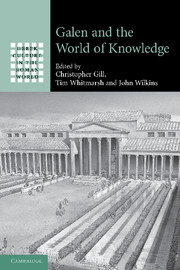Book contents
- Frontmatter
- Contents
- Notes on contributors
- Note on conventions
- Preface
- Introduction
- 1 Galen's library
- 2 Conventions of prefatory self-presentation in Galen's On the Order of My Own Books
- 3 Demiurge and Emperor in Galen's world of knowledge
- 4 Shock and awe: the performance dimension of Galen's anatomy demonstrations
- 5 Galen's un-Hippocratic case-histories
- 6 Staging the past, staging oneself: Galen on Hellenistic exegetical traditions
- 7 Galen and Hippocratic medicine: language and practice
- 8 Galen's Bios and Methodos: from ways of life to path of knowledge
- 9 Does Galen have a medical programme for intellectuals and the faculties of the intellect?
- 10 Galen on the limitations of knowledge
- 11 Galen and Middle Platonism
- 12 ‘Aristotle! What a thing for you to say!’ Galen's engagement with Aristotle and Aristotelians
- 13 Galen and the Stoics, or: the art of not naming
- Bibliography
- Index
11 - Galen and Middle Platonism
Published online by Cambridge University Press: 06 August 2010
- Frontmatter
- Contents
- Notes on contributors
- Note on conventions
- Preface
- Introduction
- 1 Galen's library
- 2 Conventions of prefatory self-presentation in Galen's On the Order of My Own Books
- 3 Demiurge and Emperor in Galen's world of knowledge
- 4 Shock and awe: the performance dimension of Galen's anatomy demonstrations
- 5 Galen's un-Hippocratic case-histories
- 6 Staging the past, staging oneself: Galen on Hellenistic exegetical traditions
- 7 Galen and Hippocratic medicine: language and practice
- 8 Galen's Bios and Methodos: from ways of life to path of knowledge
- 9 Does Galen have a medical programme for intellectuals and the faculties of the intellect?
- 10 Galen on the limitations of knowledge
- 11 Galen and Middle Platonism
- 12 ‘Aristotle! What a thing for you to say!’ Galen's engagement with Aristotle and Aristotelians
- 13 Galen and the Stoics, or: the art of not naming
- Bibliography
- Index
Summary
In Galen's mind, Plato is certainly the highest philosophical authority. While this is not a disputed fact, Galen's own philosophical allegiance is an altogether different matter: can he be reckoned among the (Middle) Platonists of his time? The answers provided to this question vary from positive to negative and to anywhere in between. Galen was no doubt well acquainted with the kind of Platonism taught in the schools: when he was fourteen years old, his father Nicon had him attend lectures by Stoic, Platonic, Epicurean and Peripatetic teachers. Galen never mentions their names, but in the case of three of these teachers he does mention the names of their masters (the Stoic Philopator, the Platonist Gaius and the Peripatetic Aspasius). However, Platonists (and, more generally, scholastic philosophers) did not arouse his admiration: Galen comments disparagingly on their lack of rigour and on their futile, irreconcilable disputes. Such divergences would have led Galen to embrace Pyrrhonian scepticism, had he not been ‘saved’ by geometry and its cognate disciplines: Galen presents geometry, not speculative philosophy, as his model for demonstrative science.
These are all well-known facts, but are not enough to solve the problem of Galen's Platonism. Galen's contemptuous remarks about contemporary philosophers should not, perhaps, be given too much weight. Scholars have argued that Galen depends not only on Plato, but also on the Platonism of his time: this is shown (inter alia) by his conception of god and providence, by his ethics and by his epistemology.
- Type
- Chapter
- Information
- Galen and the World of Knowledge , pp. 243 - 260Publisher: Cambridge University PressPrint publication year: 2009
- 7
- Cited by



